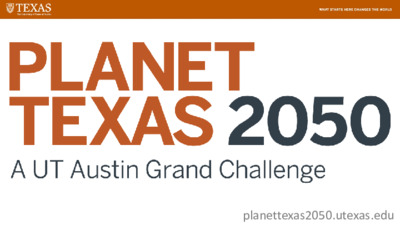Backup_JSC_20201119 2B Planet Texas 2050 — original pdf
Backup

planettexas2050.utexas.edu Dave Kramer (he/him/his) PT2050 Program Director david.kramer@austin.utexas.edu Recent Texas transplants by way of Boston and Colombia … PT2050 Vision: A Resilient Texas A Climate Crisis, Booming Growth, & Resource Strain + Deeply Interwoven Equity and Justice Issues What happens when Texas roads can’t handle the crush of traffic, systems for cooling and heating buildings break under strain, water systems fall apart, and land dries out? In the face of hurricanes, how will people safely evacuate? How will they trust and understand models? How do communities prepare for the next big storm and lay claim to the resources they need? Planet Texas 2050 is a Research Grand Challenge of UT Austin working to make Texas more resilient in the face of these challenges. What is a Grand Challenge? A wicked problem that requires new kinds of collaboration across disciplines and between diverse communities of thinkers, doers, and dreamers to solve. A grand challenge initiative addresses problems that, when solved, have a significant positive impact on people and society. Large in scale, ambitious in scope, and multi-disciplinary, university-based grand challenges come in many shapes and sizes. What is a Grand Challenge? 6 7 Who are we? Faculty Leadership + Staff Jonathan Lowell Community Liaison I am trained in social science research methods, facilitation, and community engagement. My role is to help ensure research is done with community and that its outputs have social impacts.. Highlights from first phase of PT2050 • Truly transdisciplinary, including the arts • Wide range of innovative & creative research • Deep student engagement • Vibrant & collaborative community of practice of over 127 researchers from more than 20 distinct parts of UT (Colleges, Schools, and Units) • Extreme challenges & disruptions + adaptation • Publications and leveraged funding 12 Children garden at Pleasant Hill Elementary in South Austin while their parents organize with Go! Austin/Vamos! Austin. Credit: GAVA Priorities moving forward • Apply lessons learned: How do we apply what we have learned from years 1 and 2? • Commit to justice (social, racial, environmental) through engaged solidarity • Make big bets that leave a legacy • Publish groundbreaking, innovative, transdisciplinary work as a model for grand challenges and academic leadership 18 Frontlines and Flagships Flagships Six Flagship Projects Community-driven research 23 Aspirational brainstorming • • • In a world where complexity reigns, communities come together to harness the power of many and the knowledge of all, leveraging the power of machines to achieve a new and better future for all of humanity, and nature and animals too! In a world where relationships between researchers and communities and humanity and the more-than-human-world are strained, a group of researchers learn to re-fashion those relationships within themselves and create a model for how to harness knowledge and relationships to build a better world. In a world of division between researchers and communities, between people and nature, between wealth for the few and health for all, a small group of researchers spread across the state of Texas, starting in Austin and enveloping the reset of our universities institutes across the state and with communities toward a better future. 26 Thank you! • “Hope requires uncertainty. Only if the future isn't written can we possibly wish for hope." - Susanne Moser Stay in touch: Dave Kramer, PT 2050 Program Director (he/him/his) david.kramer@austin.utexas.edu Website: planettexas2050.utexas.edu Twitter: @Planet_TX